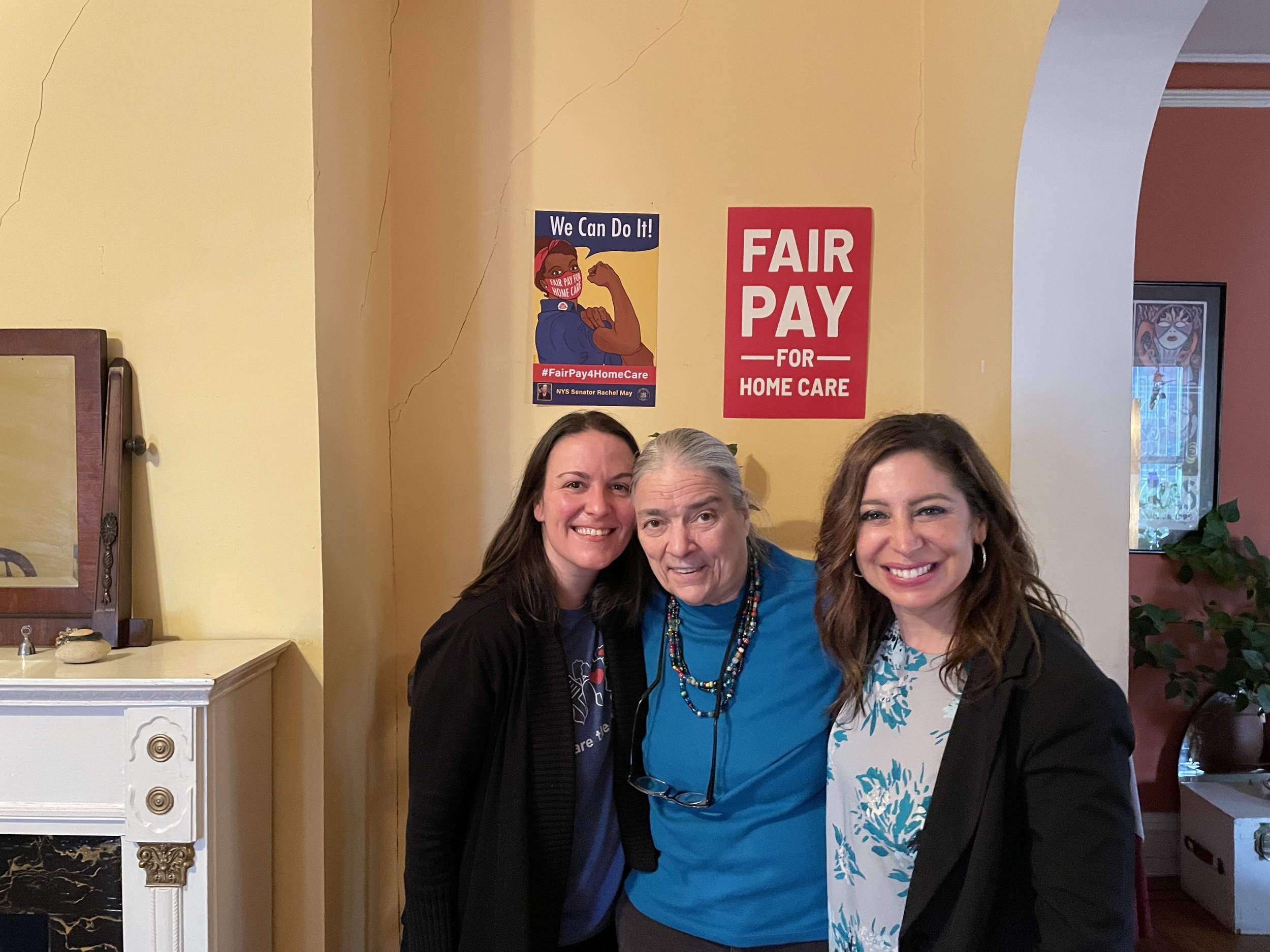Woodside family fights for better pay for home care
/Maggie and Janet Ornstein with Assemblymember Jessica González-Rojas inside their Woodside home on March 17, 2022. Eagle photo by Jacob Kaye
By Jacob Kaye
Maggie Ornstein was 17 years old when her mother, Janet Ornstein, had an aneurysm.
The Woodside family was in a tight spot. Not only would Janet need someone to take care of her 24 hours a day, 7 days a week, Maggie’s grandmother, who lived until 102 years old, was immobile and also in need of care.
“I became responsible at 17,” Ornstein said. “I've been a caregiver ever since.”
While Ornstein has been one of her mother’s primary caregivers, the family has also employed a number of home care workers. Though several have come and gone, the woman who currently takes care of Janet, who declined to have her name used in this story, has been with the family for decades and works with them four days a week.
On average, home care workers make $13.20 an hour in New York, making the profession one of the lowest wage professions in the state. A vast majority of home care workers in the state are women of color. The low wages have led to a labor shortage in the home care field leaving New York’s aging population at risk, advocates say.
As the governor and state lawmakers negotiate the state’s financial plan for the coming year, Ornstein and her family are one of a number of advocates fighting for the inclusion of the Fair Pay for Home Care bill inside the budget.
The bill, if passed, would require that home care workers be paid at least 150 percent of minimum wage. It would also direct the state’s Department of Health commissioner to set regional rates of reimbursement for home care aids under Medicaid and other managed care plans.
The bill, sponsored by Senator Rachel May and Assemblymember Richard Gottfried, has broad support among legislators. Not only did the two legislative bodies include the bill in its one-house budget, 45 senators and 99 assemblymembers have signed onto the legislation as co-sponsors.
One of the only things holding the bill back is the state’s complex Medicaid system. During a February joint legislative public hearing on healthcare and Medicaid, Brett Friedman, the state’s Medicaid director, said that due to complications with the state’s Medicaid system, raising pay for home care workers wouldn’t translate to take home pay for the workers.
Instead, Mary Bassett, the commissioner of the state health department said one-time bonuses for health care workers, which the governor has proposed, would go directly to the workers.
“Home care is only one element of the healthcare workforce that’s struggling in their environment and we need to think about the investments taken across the healthcare sector,” Friedman said. “As a policy matter, we’re looking to do things that are designed to get money quickly to promote recruitment, retention.”
“Wage increases…are inherently complex and the money takes additional time to get down to the worker,” he added. “The bonus approach to us is far more timely and implementable.”
But lawmakers and advocates say the wage increase is needed and long overdue.
“Those workers are dealing with very unpleasant things, it’s very hard,” said Queens Assemblymember Jessica González-Rojas, a supporter of the bill.
On a recent March afternoon, González-Rojas visited the Ornsteins’ Woodside home. The house has been in the family for generations, something Ornstein credits with her family’s economic survival.
“I'm privileged to have this home,” she said. “If not for this house, my mother would have been in an institution, she'd be dead, my grandmother would have ended up in a nursing home and I would have been homeless.”
While the care Ornstein provides has made it untenable for her to work a full time job, she’s stayed busy. She currently teaches part-time at Sarah Lawrence College, however, her entire paycheck goes toward the family’s health insurance costs. She’s earned multiple degrees, including a PhD, and now researches long-term care.
Ornstein has set her research focus on family caregivers and their interactions with the healthcare system and its services. It’s a topic she’s intimately familiar with.
Undervaluing the care that family members give other family members is another issue entirely, Ornstein said, one that she’ll start fighting for after the Fair Pay for Home Care bill is passed. In New York State, Medicare does not pay for family members to provide care.
“Between lost wages and unpaid care labor, it’s like $3 to $4 million over the last 20 years,” Ornstein said.
But the impact of the labor goes beyond just the dollar amount, Ornstein said.
“When I was in my 20s and 30s, I didn't think caregiver stress was really a thing,” she said. “But now I feel the cumulative impacts over the past 26 years.”
Increasing pay for home health care workers won’t just address the labor shortage or improve care for those who need it – the families of those who need care will also start to feel the effects and some of the pressure will be taken off, Ornstein said.
“It's obvious how fair pay will help the workers and the people who need care,” she said. “I think it's less obvious how it will help family members who do a majority of the care.”
The state’s budget is due on April 1.




